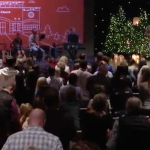On meeting death as a sister
This story originally appeared at Baptist News Global on December 1, 2022.
What if death isn’t the enemy we often think it is? And what if reconsidering our theology of death might help us live deeper into the union of self and neighbor?
In four weeks, Christians across the world will celebrate the birth of Jesus. In the meantime, there are parties to plan and presents to order. Some segments within Christianity will become co-opted by capitalism as well as culture wars about saying “Merry Christmas” and using properly designed coffee cups. Before they focus on a humble penniless baby, descended from heaven, wrapped in swaddling clothes and lying in a manger.

Rick Pidcock
One common saying Christians use during this season is that Jesus was “born to die.” Due to the consensus among evangelicals that Jesus’ death was a substitutionary atonement that paid the penalty we deserved, many of us find ourselves thinking of our own deaths during this time.
The cold winter of December often is seen as a metaphor for the season of growing old and dying. As we grow older, and more of our family and friends pass away, the interrupting sting of death feels all too real.
The duality of birth and death
Birth and death are seen as opposites. The former brings new beginnings, while the latter ends what once began. We personify death and refer to it as “the enemy,” as something that has been or that needs to be conquered. Young earth creationists refuse to accept modern science because they believe there was no death before the fall, which as they see it totally disproves evolution.
My first experience with death was seeing my dad say goodbye to his mother for the last time when I was 12 years old. My next experience with death was when my non-Christian grandfather passed away while I was in college. I was convinced he was condemned to the second death in the lake of fire and that it was all my fault.
Years later, I experienced the deaths of more grandparents, as well as the deaths of two of our own babies. One year ago, I came face to face with death again as my wife was diagnosed with stage three breast cancer. Thankfully, she is now cancer free. And then this past June, I stood in the hospital room while my mom informed my dad, who had just been wheeled in after suffering a major heart attack, that she had just said goodbye on the phone to her mom while he was in surgery.
Death, mourning and hope
We all fear death. And when death comes for those we love, we mourn with a sorrow too deep for words. But the words we choose say a lot about the sorrow simmering in our souls.
“The words we choose say a lot about the sorrow simmering in our souls.”
There’s a thin line between saying, “We sorrow not as those who have no hope,” and being in denial about your grief. Growing up, I remember envisioning the funerals of non-evangelicals as gatherings of people wailing and sobbing uncontrollably rather than celebrating their loved one’s arrival into heaven.
But what does it mean to sorrow in death with hope? When Paul wrote about sorrowing with hope, he referred to sorrowing in light of our future resurrection. But for many of us, the expectations of living in a throne room after we die are shaky at best. And even if it were literally true, many of us are not sure we’re up for that.
What we long for as we mourn is a hope we can touch, taste, see, smell and hear all around us in the lives we’re experiencing now.
Resisting death by controlling others
How we respond when death approaches affects how we live.










Leave a Reply
Want to join the discussion?Feel free to contribute!